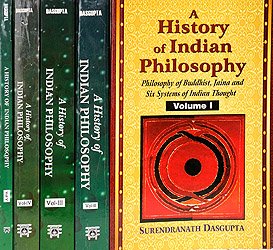A History of Indian Philosophy Volume 4
Indian Pluralism
by Surendranath Dasgupta | 1949 | 186,278 words | ISBN-13: 9788120804081
This page describes the philosophy of the bhagavata-purana (introduction): a concept having historical value dating from ancient India. This is the first part in the series called the “the bhagavata-purana”, originally composed by Surendranath Dasgupta in the early 20th century.
Part 1 - The Bhāgavata-purāṇa (introduction)
The Bhāgavata-purāṇa shares with the Bhagavad-gītā a unique position in the devotional literature of India. It cannot however claim the same antiquity: before the tenth century a.d. no references to it have been discovered by the present writer. Even Rāmānuja (born in a.d. 1017) had not mentioned its name or made any quotations from it. But by the time of Madhva the work had become famous: one of the principal works of Madhva (thirteenth century A.D.) is called the Bhāgavata-tātparya, in which he deals with the principal ideas of the Bhāgavata-purāṇa, and lays emphasis on them so far as they support his views. The thoughts of the Bhāgavata-purāṇa are loftily poetic, but the style is more difficult. The present writer is of opinion that it must have been composed by a Southerner, as it makes references to the Āḷvars, who have probably never been referred to by any writer in Northern or Upper India. The Bhāgavata-purāṇa, however, was so much appreciated that immediately commentaries were written upon it.
Some of these commentaries are:
- Amṛta-raṅgiṇī,
- Atmapriyā,
- Kṛṣṇa-padī,
- Caitanya-candrikā,
- Jaya-maṅgalā,
- Tattva-pradīpikā,
- Tātparya-candrikā,
- Tātparya-dīpikā,
- Bhagavallīlā-cintāmaṇi,
- Rasa-mañjarī,
- Śukapakṣīyā Prabodhinī,
- a ṭīkā by Janārdana bhaṭṭa,
- a ṭīkā by Narahari,
- Prakāśa by Śrīnivāsa,
- Tattva-dīpikā by Kalyāṇa Rāya,
- a ṭīkā by Kṛṣṇa bhaṭṭa,
- a ṭīkā by Kaura Sādhu,
- a ṭīkā by Gopāla Cakravartī,
- Anvaya-bodhinī by Cūḍāmaṇi Cakravartī,
- Bhāva-prakāśikā by Narasimhācārya,
- a ṭīkā by Yadupati,
- Subodhinī by Vallabhācārya,
- Pada-ratnāvalī by Vijayadhvaja-tīrtha,
- a ṭīkā by Vitthala Dīkṣita,
- Sārārtha-darśinī by Viśvanātha Cakravartī,
- a ṭīkā by Viṣṇusvāmin,
- Bhāgavata-candrikā by Vīrarāghava,
- Bhāvārtha-dīpikā by Śivarāma,
- Bhāvārtha-dipikā by Śrīdhara-svāmī,
- Sneha-pūraṇī by Keśavadāsa,
- a ṭīkā by Śrīvāsācārya,
- a ṭīkā by Satyābhinava-tīrtha,
- a ṭīkā by Sudarśana Sūri,
- a ṭīkā by Braja-bhūṣaṇa,
- Bhāgavata-purāṇārka-prabhā by Hari-bhānu,
- Bhāgavata-purāṇa-prathama-śloka-ṭīkā by Jayarāma and Madhusūdana Sarasvatī,
- Pañcama-skandha-ṭīkā by Vallabhācārya,
- Subodhinī by Bālakṛṣṇa Yati,
- Vaiṣṇava-toṣiṇī by Sanātana Gosvāmī,
- Budharañjinī by Vāsudeva,
- Nibandha-prakāśa by Vitthala Dīkṣita,
- Anukramaṇikā by Vallabhācārya,
- Ekādaśa-skandha-tātparya-candrikā by Brahmānanda,
- Anukramaṇikā by Vopadeva.
Many other works also have been written on the diverse subjects of the Bhāgavata-purāṇa and some have also summarized it. Some of these works are by Rāmānanda-tīrtha, Priyādāsa, Viśveśvara, Puruṣottama, Śrīnātha, Vmdāvana Gosvāmī, Viṣṇu Puri and Sanātana.
